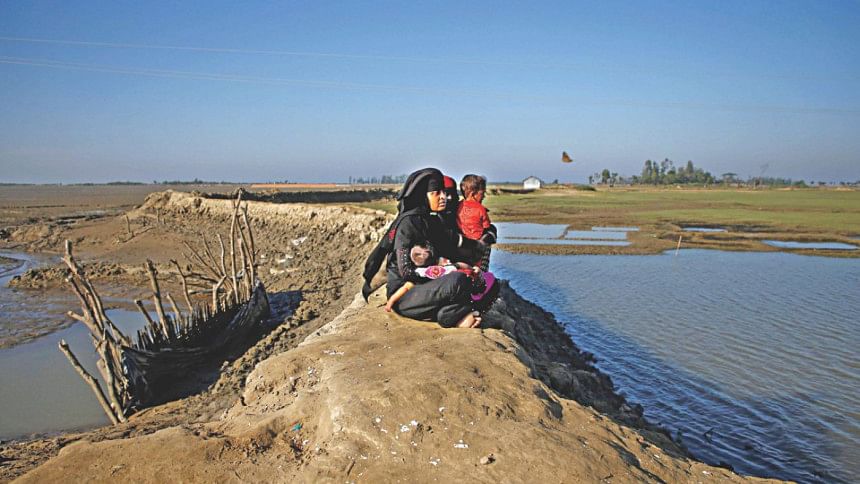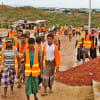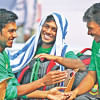Redistribute refugees

High concentration of the Rohingya population in Cox's Bazar is posing serious risks for the economy and ecology of the tourist district, said an alliance of civil society and non-government organisations yesterday.
The local population of Cox's Bazar is 27 lakh, while the number of Rohingyas stands at 800,000, which might become around 10 lakh by the year's end, making Cox's Bazar the most densely populated district in Bangladesh, they said.
While population density per square kilometre in the country would be 1152 by the year end, it would be 1485 in Cox's Bazar, said the alliance -- Cox's Bazar Civil Society Organisations- NGO Forum (CCNF) -- in a press conference at Dhaka Reporters Unity.
"The Rohingyas are also spreading out beyond the designated camps. They have taken shelter in Cox's Bazar town, both sides of Marine Drive and in other upazilas of the district. This is a serious risk for tourism," said Rezaul Karim Chowdhury, co-chair of CCNF.
The prices of essentials in Ukhia, Teknaf and Cox's Bazar town have gone up, while underground water levels are depleting, he said.
Referring to forest department officials, Rezaul Karim, also executive director of COAST Trust, said about 4000 acres of forest in Ukhia and Teknaf have been damaged, costing some Tk 400 crore.
Destruction of the forest and obstructions on designated elephant corridors have also led to increasing elephant-human conflict, he added.
Against this backdrop, CCNF demanded the Rohingya people be redistributed to other districts to ease the pressure on Cox's Bazar. Also, those who took shelter in Marine Drive and Cox's Bazar town should be relocated, the forum said.
Presently, all boat services at the Naf River are halted for security reasons, which also caused the closure of many hotels in Saint Martin's and suspended launch services to the island. This is heavily affecting tourism in the area, it said.
In a statement distributed at the press conference, CCNF proposed that the government, in association with the UN and other organisations, conduct a survey to assess the economic, ecological and health impacts in Cox's Bazar.
"Based on that, the government has to declare a long-term plan and allocate money to recover the damages," it said.
CCNF suggested creating an Environment Restoration Fund with a portion of the money being mobilised for the refugee crisis.
Aminur Rasul Babul of Unnayan Dhara suggested that all the national, international and local NGOs need to be made accountable to the Refugee Relief and Repatriation Commissioner's (RRRC) office in Cox's Bazar.
He suggested that the UN Refugee Agency, UNHCR, take lead of this Rohingya relief operation as mandated by UN. This will help Bangladesh negotiate better in the international arena with regards to addressing the Rohingya crisis, he added.
CCNF said UN agencies and international NGOs should work in the relief operations in partnership with local NGOs for better outcome and reduction of transaction costs.
He also demanded that all agencies working in the Rohingya camps publish aid data for public monitoring and maintaining transparency and accountability at a local level.
AKM Jashim Uddin, director of ADAB, a coordinating body of NGOs in Bangladesh, suggested electric lighting in the Rohingya camps and allowing cultural groups to promote human and cultural values among the Rohingya community.
CCNF suggested that the Bangladesh government and civil society initiate appropriate documentation, research and publicity on the ethnic cleansing of the Rohingya by the Myanmar security forces so that the issue can be raised at the International Court.
Meanwhile, the National Coordinating Committee of Religious and Ethnic Minority Organisation yesterday submitted a memorandum to the Myanmar embassy in Dhaka, demanding immediate repatriation of the Rohingyas and granting them citizenship.
“The Rohingya problem should be solved under the light of Prime Minister Sheikh Hasina's five points, which was presented in the UN,” said advocate Rana Das Gupta, coordinator of the committee that comprises of 19 religious and ethnic groups, at a briefing to reporters at Gulshan-2 circle.

 For all latest news, follow The Daily Star's Google News channel.
For all latest news, follow The Daily Star's Google News channel. 








Comments